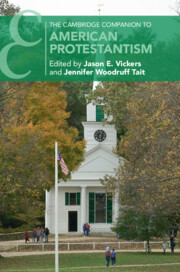Book contents
- The Cambridge Companion to American Protestantism
- Cambridge Companions to Religion
- The Cambridge Companion to American Protestantism
- Copyright page
- Dedication
- Contents
- Contributors
- Acknowledgments
- Introduction
- Part I Historical Overview
- Part II The Religious Culture of American Protestantism
- Part III Theological Traditions
- 17 Anglicanism
- 18 The Reformed Tradition
- 19 The Lutheran Tradition
- 20 Brethren and Mennonite Traditions
- 21 Baptists
- 22 The Stone-Campbell Movement
- 23 Wesleyan-Methodist and Holiness Traditions
- 24 Pentecostalism
- Selected Bibliography
- Index
- Cambridge Companions to Religion (continued from page ii)
19 - The Lutheran Tradition
from Part III - Theological Traditions
Published online by Cambridge University Press: 11 May 2022
- The Cambridge Companion to American Protestantism
- Cambridge Companions to Religion
- The Cambridge Companion to American Protestantism
- Copyright page
- Dedication
- Contents
- Contributors
- Acknowledgments
- Introduction
- Part I Historical Overview
- Part II The Religious Culture of American Protestantism
- Part III Theological Traditions
- 17 Anglicanism
- 18 The Reformed Tradition
- 19 The Lutheran Tradition
- 20 Brethren and Mennonite Traditions
- 21 Baptists
- 22 The Stone-Campbell Movement
- 23 Wesleyan-Methodist and Holiness Traditions
- 24 Pentecostalism
- Selected Bibliography
- Index
- Cambridge Companions to Religion (continued from page ii)
Summary
One of the largest branches of Protestantism, Lutherans have been in North America for more than 400 years. Lutheranism was established on this continent initially by immigrants from the historically Lutheran areas in Europe, notably Germany, Scandinavia, and Eastern Europe. More recent Lutheran immigrants have come from younger Lutheran churches in Asia and Africa. In the United States, these immigrants formed congregations and denominations mainly based on language and ethnicity, although they were also divided by theological and religious differences. As these immigrant communities acculturated to the use of English and to the American religious culture, they began a long process of denominational consolidation, as well as moving into the mainstream of national life. American Lutherans still dominate a number of regions of the United States, maintain a quality system of educational institutions and social service agencies, and play a leadership role among Lutherans around the world.
Keywords
- Type
- Chapter
- Information
- The Cambridge Companion to American Protestantism , pp. 369 - 383Publisher: Cambridge University PressPrint publication year: 2022

